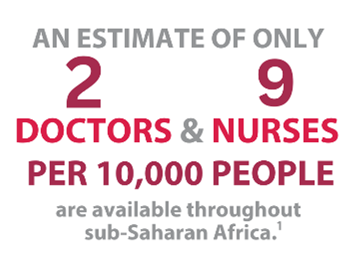Breaking Barriers: Amref Health Africa Grant Aims to Transform Children's Healthcare Access Across Southern Senegal's Poorest Regions
Astellas Global Health Foundation $1.7 million, three-year grant supports comprehensive training and school-centered services to help an estimated 340,000+ local children and families

Access to quality healthcare services in Africa remains highly challenging. African women and girls are the most vulnerable to ill health because of contributing factors that include gender inequity, poverty, and sexual and gender-based violence.2 In fact, nearly 200,000 women in Africa die every year during pregnancy and childbirth from preventable causes,3 and an estimated 38 per 1,000 live births in Senegal result in a death prior to age five.4
In 2022, The Astellas Global Health Foundation ("Foundation") announced its support of Amref Health Africa with an almost $1.7 million grant over three years to tackle the critical need for improved healthcare access for children in Senegal, specifically in the Kolda and Sédhiou regions.
Kolda and Sédhiou are the poorest regions in Southern Senegal, with 78% and 71% (respectively) of the population living in poverty. Low immunization rates, lack of qualified medical teams, and scarcity of food and clean water have combined to cause high infant and child mortality rates.5
As a result of the Foundation's grant, Amref Health Africa will train and deploy skilled health workers and expand access points for child health services in these under-resourced regions of Senegal, helping an estimated 36,000 women of reproductive age receive education on children's health and more than 340,000 children receive the care they need.
Amref's initiative plans to target three key environments for children's development: schools, communities, and health facilities. During its first year, Amref is working to create 60 school health centers for children ages 6-14 to conduct health education, intervention, and preventative services. Year two will develop trained community health volunteers (CHVs) to engage their individual communities and sensitize women's reproductive health and children's health. In its third year, the work continues as frontline healthcare workers will gain knowledge to contribute to medical and surgical care for children referred to the facility by reducing the barrier of quality and availability of health services.
This funding is the latest example of the Astellas Global Health Foundation's deep commitment to supporting access to health initiatives in highly vulnerable communities where Astellas does not have a business presence. Success is defined by the Foundation's ability to make a meaningful impact by supporting charitable organizations like Amref that actively contribute to the achievement of the UN Sustainable Development Goals, particularly Goal 3: Ensure healthy lives and promote well-being for all at all ages.6

As part of the Capital Santé program, the health club for students at the Saré Dianfo school in Kolda allows them to learn in a fun and educational way about hygiene and sanitation.
Click on additional stories to learn more about how the Astellas Global Health Foundation is helping to build One World, A Healthier Tomorrow.
References:
1 Amref Health Africa website. Accessed January 12, 2023. https://amrefusa.org/what-we-do/training-health-workers/
2 Amref Health Africa website. Accessed January 12, 2023. https://amrefusa.org/what-we-do/maternal-and-child-health/
3 Amref Health website. Accessed January 12, 2023. https://amrefusa.org/wp-content/uploads/2019/12/maternal-health-fact-sheet.pdf
4 World Bank data. Accessed January 12, 2023. https://data.worldbank.org/indicator/SH.DYN.MORT?locations=SN
5 Astellas Global Health Foundation information on file.
6 World Bank data. Tracking University Health Coverage: 2017 Global Monitoring Report. Accessed on January 13, 2022. https://documents1.worldbank.org/curated/en/640121513095868125/pdf/122029-WP-REVISED-PUBLIC.pdf
